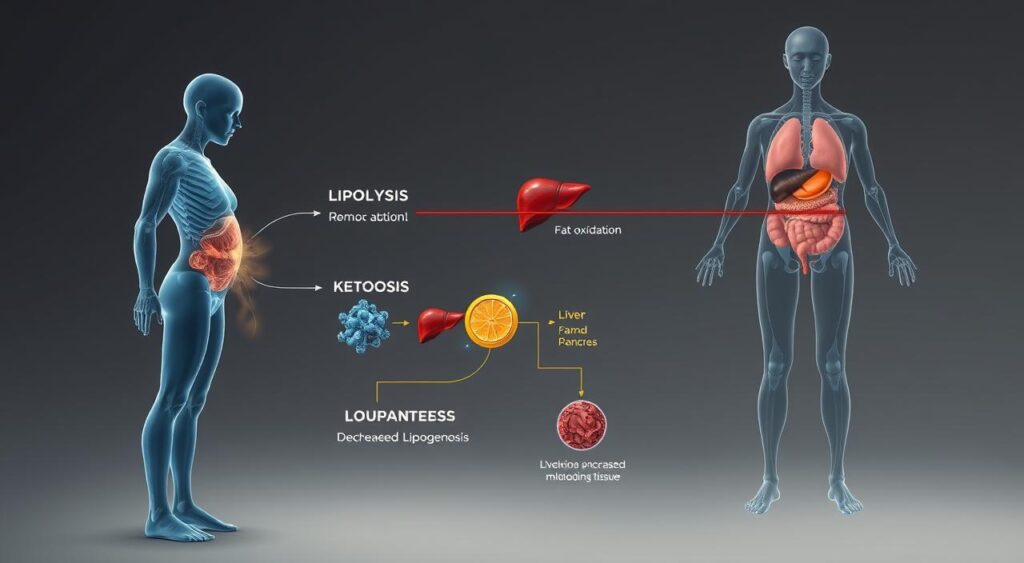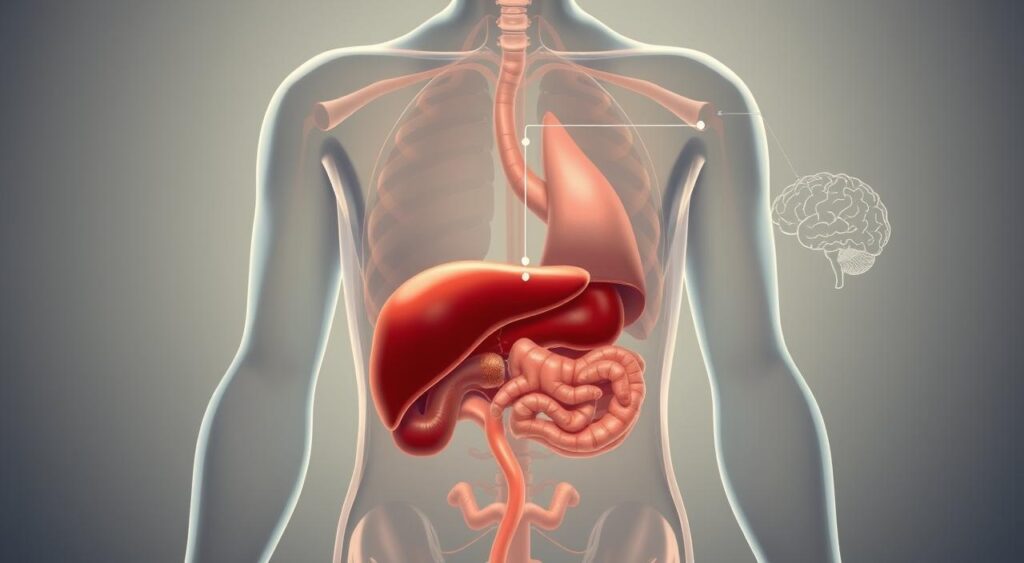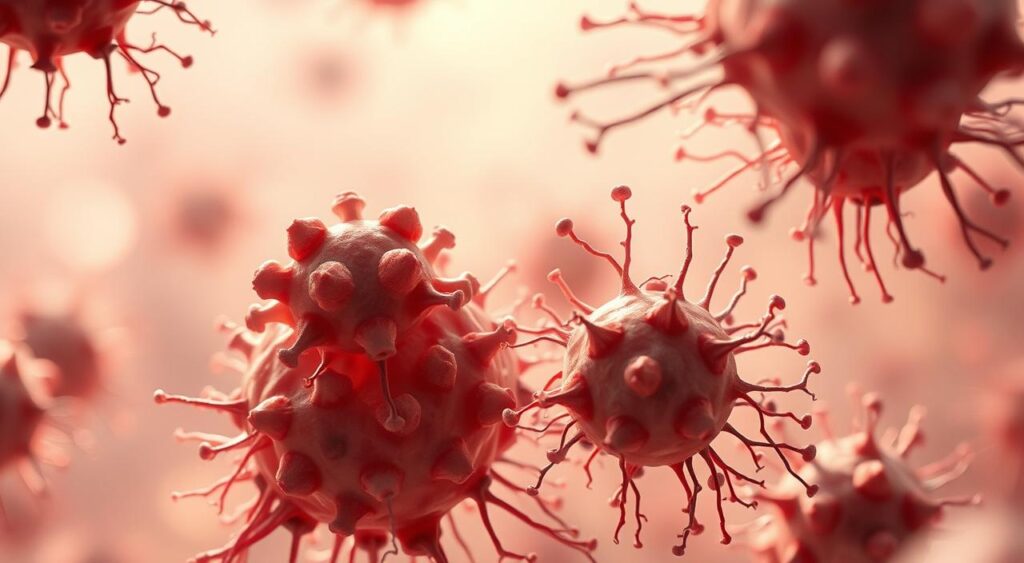What if a simple eating pattern could change your health, boost your brain, and help you lose weight? Intermittent fasting might be the game-changer you’ve been looking for.
Imagine a diet that’s more than just eating less. Intermittent fasting is backed by science and could greatly improve your health. It involves periods of eating and fasting, which may unlock amazing health benefits.
The benefits of intermittent fasting are wide-ranging. It can improve brain function and help with weight management. This eating pattern has caught the eye of researchers globally. You’ll learn how timing your meals can change your metabolism, brain function, and long-term health.
Looking to improve your weight, mental clarity, or overall health? Intermittent fasting is a promising option. This article will explore the science behind it. You’ll see how changing your eating schedule can unlock your body’s full power.
Understanding Intermittent Fasting: A Historical Perspective
Intermittent fasting isn’t new. It’s a tradition that goes back to our ancestors. They went without food for long periods because of hunting and gathering. This became a key survival strategy that has influenced our metabolism for thousands of years.
Today, starting with intermittent fasting is rooted in ancient traditions. Various cultures and religions have their own ways of fasting. They saw its health and spiritual benefits.
Evolution of Fasting in Human History
- Prehistoric humans faced irregular food availability
- Hunter-gatherer societies adapted to feast and famine cycles
- Natural periods of food scarcity shaped human metabolism
Traditional Fasting Practices Across Cultures
For centuries, fasting has been a part of many cultures and religions. From Ramadan in Islamic traditions to Buddhist meditation, fasting is seen as a way to cleanse the body and soul. Intermittent fasting strategies have roots in many civilizations.
Modern Scientific Interest in Fasting
Today, scientists are studying the health benefits of fasting. They look into how it affects our metabolism, cell repair, and overall health. The link between our ancient past and modern health is fascinating to doctors.
Fasting is not about starving, but about strategic nutritional timing.
Learning about the history of intermittent fasting shows it’s more than a diet trend. It’s a practice that’s part of our biology and culture. It offers benefits that go beyond just losing weight.
The Science Behind Metabolic Switching
Intermittent fasting starts a cool biological process called metabolic switching. When you fast, your body changes how it makes energy. It moves from using glucose to burning fat for fuel.
The science behind this change is complex but effective. Your body usually uses glucose from food for quick energy. But when fasting goes on for hours, it uses up sugar and starts burning fat. This switch is a survival trick that has been around for thousands of years.
- Energy source transitions from glucose to fat
- Triggers cellular repair mechanisms
- Promotes more efficient fat burning
Studies show that fasting has big benefits for your metabolism. It helps with weight loss and keeps cells healthy. When fasting, your body starts autophagy, cleaning out old cells and making new ones.
“Metabolic switching is like hitting a reset button for your body’s energy systems,” says Dr. Mark Mattson, a leading neuroscience researcher.
Understanding metabolic switching shows why fasting is more than a diet. It’s a science-backed way to change your body’s energy use and improve health.
Different Types of Intermittent Fasting Schedules
Intermittent fasting is a flexible way to eat, with many schedules to choose from. Each schedule fits different lifestyles. Finding the right one helps meet your health goals and daily routine.
Choosing the right schedule is key to a successful wellness journey. Each method has its own benefits and challenges. It’s important to pick one that fits your needs.
The 16/8 Method: A Popular Starting Point
The 16/8 method is great for beginners. It involves:
- Fasting for 16 hours straight
- Eating within an 8-hour window
- Keeping meal times the same every day
People usually eat between noon and 8 PM. This helps their body adapt and makes meal planning easier.
The 5:2 Protocol: Flexible Calorie Restriction
The 5:2 method is for those who like variety:
- Eat normally for 5 days
- Reduce calories (500-600) for 2 non-consecutive days
- Offers more flexibility in diet
Alternate Day Fasting: Intensive Approach
This schedule alternates between full eating days and fasting days. It’s strict but can lead to big health benefits for those who stick to it.
Choosing the right schedule depends on your lifestyle, health goals, and what you prefer. Talking to a healthcare professional can help pick the best one for you.
Weight Loss and Fat Burning Mechanisms

Intermittent fasting is a strong way to change your body’s shape. It starts special metabolic processes that help you burn fat better than regular diets.
Your body changes a lot during fasting. These changes help you burn fat:
- Reduces insulin levels, making stored body fat more accessible
- Increases human growth hormone production
- Enhances metabolic rate
- Triggers cellular repair processes
Science shows that intermittent fasting works well. Studies found big weight losses in people who tried it:
| Fasting Method | Average Weight Loss | Duration |
|---|---|---|
| Whole-Day Fasting | Up to 9% | 12-24 weeks |
| Alternate-Day Fasting | 3-8% | 3-12 weeks |
The best thing about intermittent fasting is it helps you eat less naturally. By eating less often, you eat fewer calories. Plus, it makes your body better at using fat for energy.
Studies show intermittent fasting is better than just eating less for keeping weight off.
Your body gets good at using fat for energy during fasting. This makes it a great way to lose weight.
Impact on Brain Health and Cognitive Function
Intermittent fasting does more than help with weight loss. It also boosts brain health and improves thinking skills. Studies show how fasting can change your brain for the better.
Your brain gets better when you fast. Fasting turns on important brain processes. These help you think better and keep your brain healthy.
Neurotransmitter Changes During Fasting
Fasting changes your brain’s chemistry. Key changes include:
- More brain-derived neurotrophic factor (BDNF)
- Better control of dopamine and serotonin
- Less inflammation in brain paths
Memory Enhancement Benefits
Intermittent fasting might make your memory better. Research shows fasting can:
- Make the hippocampus more flexible
- Strengthen brain connections
- Help with long-term memory
Protection Against Neurodegenerative Diseases
| Neurodegenerative Condition | Potential Fasting Impact |
|---|---|
| Alzheimer’s Disease | Less protein buildup |
| Parkinson’s Disease | Better cell repair |
| Cognitive Decline | More brain cell growth |
By fasting, you’re not just losing weight. You’re also protecting your brain and keeping your mind sharp.
Blood Sugar Management and Insulin Sensitivity

Intermittent fasting does more than help you lose weight. It also helps control blood sugar and improve how well your body uses insulin. Keeping your blood sugar in check is key to staying healthy and avoiding diseases.
Studies show that intermittent fasting can change how your body handles insulin and blood sugar. When you fast, your body starts to work differently. It can reset how it responds to insulin and make your cells work better.
- Reduces insulin resistance
- Stabilizes blood glucose levels
- Enhances metabolic flexibility
- Supports long-term metabolic health
A 2023 study found some great news about intermittent fasting. People who fasted three days a week saw better insulin sensitivity and a lower risk of type 2 diabetes.
“Intermittent fasting can be a powerful tool for metabolic health restoration” – Dr. Emily Richardson, Metabolic Research Institute
By giving your body breaks from eating, you help it use glucose better. This makes your cells more sensitive to insulin. It could lower your risk of long-term metabolic problems.
Cardiovascular Health Benefits
Intermittent fasting does more than help you lose weight. It also boosts your heart health. Your heart can see big changes with this eating method.
Studies show that intermittent fasting is good for your heart. It makes your body work in ways that protect your heart.
Blood Pressure Regulation
Intermittent fasting can lower your blood pressure. Research shows it can:
- Reduce systolic and diastolic blood pressure
- Decrease overall cardiovascular strain
- Promote natural blood pressure management
Cholesterol Level Improvements
Intermittent fasting can also help with cholesterol. It may improve your lipid profile in these ways:
| Cholesterol Marker | Potential Improvement |
|---|---|
| Total Cholesterol | 5-10% Reduction |
| LDL Cholesterol | 7-15% Decrease |
| Triglycerides | 10-20% Reduction |
Heart Disease Risk Reduction
Intermittent fasting might lower your risk of heart disease. It helps protect your heart in many ways.
“Intermittent fasting is not just a diet, it’s a strategic approach to metabolic health.” – Dr. Jason Fung
Always talk to a doctor before starting any new diet. Make sure it’s right for you.
Cellular Repair and Autophagy Processes

Intermittent fasting starts a deep cleaning in your body called autophagy. It helps get rid of damaged cells and proteins. This is like a deep clean inside your body.
When you fast, your cells start fixing themselves. Autophagy gets better at breaking down old or bad parts of cells. This keeps your cells healthy and stops diseases.
- Removes damaged cellular proteins
- Promotes cellular regeneration
- Reduces oxidative stress
- Supports overall cellular health
Mark Mattson from the National Institute on Aging found fasting and autophagy are good for health. They help keep your brain sharp and improve health markers.
| Autophagy Stage | Cellular Impact |
|---|---|
| Initiation | Cellular stress detection |
| Expansion | Protein and organelle breakdown |
| Completion | Cellular renewal and regeneration |
By fasting, you can boost your body’s natural repair. The intermittent fasting benefits are more than just losing weight. They help keep your cells healthy and extend your life.
Human Growth Hormone Production
Intermittent fasting does more than help with weight loss. It changes how your body makes hormones, like human growth hormone (HGH). This hormone is key for metabolism, keeping muscles strong, and might even help you look younger.
Studies show fasting makes HGH levels go up a lot. Your body starts to change in ways that boost hormone production when you fast.
Muscle Preservation Strategies
Many think fasting hurts muscle, but it actually helps keep it strong. Your body gets better at saving muscle during fasting. This is thanks to:
- Improved protein recycling
- More growth hormone
- Better cell repair
Anti-aging Potentials
HGH is important for slowing aging. Fasting can help with aging in several ways:
- Less inflammation in cells
- Cells heal and grow better
- Metabolism works more efficiently
“Fasting is the first principle of medicine; fast and see the strength of the spirit reveal itself.” – Rumi
| HGH Production Factor | Fasting Impact |
|---|---|
| Baseline HGH Levels | 20-30% Increase |
| Muscle Protein Synthesis | Enhanced Efficiency |
| Cellular Repair Rate | Accelerated |
Learning about these hormone changes can help you get the most from fasting. It supports your health goals for the long term.
Inflammation Reduction and Disease Prevention

Intermittent fasting does more than help you lose weight. It also fights chronic inflammation, a major cause of serious health issues.
Chronic inflammation can lead to big health problems, like:
- Heart disease
- Autoimmune disorders
- Cancer risks
- Metabolic syndrome
Studies show fasting can really help lower inflammation. A 2022 review looked at 18 studies. It found big drops in C-reactive protein, a key inflammation marker.
Fasting triggers the body’s repair processes. It helps:
- Reduce oxidative stress
- Get rid of damaged cells
- Help cells grow back healthier
Adding regular exercise to fasting can make these effects even stronger. This could help protect against chronic diseases more.
“Inflammation is the common thread linking many chronic health conditions” – Modern Nutritional Research
By using intermittent fasting wisely, you can change your body’s inflammatory response. This can help you stay healthy for a long time.
Optimal Nutrition During Eating Windows
Creating a good intermittent fasting meal plan is all about smart nutrition and mindful eating. Your eating times are key to feeding your body with top-notch nutrients. Knowing what to eat and how much can greatly impact your intermittent fasting for beginners journey.
Recommended Foods for Maximum Benefits
Your meal plan should include foods rich in nutrients. These foods give you lasting energy and help your metabolism. Make sure to include:
- Lean proteins (chicken, fish, tofu)
- Complex carbohydrates (quinoa, sweet potatoes)
- Healthy fats (avocados, nuts, olive oil)
- Plenty of vegetables and fruits
Portion Control Strategies
It’s important to control your portions during eating times. Here are some tips to help you:
| Meal Type | Recommended Portion | Calorie Range |
|---|---|---|
| Protein | 3-4 oz | 100-150 calories |
| Carbohydrates | 1/2 cup | 80-100 calories |
| Vegetables | 1-2 cups | 25-50 calories |
Hydration Guidelines
Drinking enough water is key during intermittent fasting. Drink water all day, not just during meals. Aim for 8-10 glasses a day. Herbal teas or drinks with electrolytes can also help keep you hydrated.
Safety Considerations and Contraindications
When you start with intermittent fasting, knowing the risks is key. Not everyone should try this eating method without thinking it through. Some people need to be extra careful.
Some groups should stay away from intermittent fasting. These include:
- Children and teenagers under 18 years old
- Pregnant or breastfeeding women
- People with type 1 diabetes who require insulin
- Individuals with a history of eating disorders
- Those with significant underlying health conditions
Always talk to a doctor before starting any fasting plan. Your health history, current health, and nutritional needs are important. They help decide if fasting is safe for you.
Side effects of fasting can be:
- Hunger and irritability
- Potential nutrient deficiencies
- Disrupted sleep patterns
- Hormonal imbalances
Pay attention to how your body reacts to fasting. If you keep feeling bad, it might mean fasting isn’t for you. Fasting should make you healthier, not worse.
“Health is not one-size-fits-all. What works for one person may not work for another.” – Nutrition Expert
Your health journey is unique. Always put your health first. Be ready to change or stop fasting if it doesn’t feel right.
Common Mistakes to Avoid
Starting an intermittent fasting schedule can be tough for beginners. Knowing common mistakes helps you do better and get more health benefits.
For beginners, it’s important to watch out for common mistakes. Your approach and strategy are key to success.
Navigating Feeding Windows Wisely
Managing your eating windows is a big challenge in intermittent fasting. Many think they can eat as much as they want during these times.
- Avoid consuming excessive calories
- Focus on nutrient-dense foods
- Practice mindful eating
- Plan meals in advance
Understanding Appropriate Fasting Durations
Choosing the right fasting schedule is essential. Eating too little can make your body store more fat.
| Fasting Method | Duration | Potential Risks |
|---|---|---|
| 16/8 Method | 16 hours | Low risk |
| 24-Hour Fast | 24 hours | Moderate risk |
| Extended Fasting | 48+ hours | High metabolic disruption risk |
Pro tip: Gradually increase your fasting duration to allow your body to adapt and prevent metabolic challenges.
Your body needs time to adjust to new eating patterns. Patience and consistency are key to successful intermittent fasting.
Getting Started with Intermittent Fasting
Starting intermittent fasting can seem daunting at first. It’s important to be patient and plan carefully. First, talk to a healthcare professional to make sure it’s right for you.
Here are some key tips for beginners:
- Find an intermittent fasting schedule that matches your life
- Begin by fasting longer at night
- Drink water when you can’t eat
- Eat foods rich in nutrients during your eating times
Pro tip: Listen to your body and be flexible with your approach. Many start with the 16/8 method. This means fasting for 16 hours and eating in an 8-hour window.
“Consistency is more important than perfection in intermittent fasting.” – Nutrition Experts
At first, you might feel hungry and adjust slowly. Being mentally prepared and having support helps a lot.
Everyone reacts differently. Keep track of your progress and stay motivated. Don’t worry if you face challenges at first. Getting better at intermittent fasting takes time and practice.
Tracking Progress and Adjusting Your Protocol
Keeping track of your intermittent fasting journey is key to success. An intermittent fasting app can be your best friend in tracking your progress and staying motivated. These apps help you log important metrics and show your fasting results clearly.
Important metrics to track include:
- Body weight and composition
- Energy levels throughout the day
- Hunger patterns
- Sleep quality
- Workout performance
Intermittent fasting needs flexibility. Listen to your body and be ready to change your fasting schedule. Some people might need to adjust their eating windows or fasting time based on how they feel and their lifestyle.
If you hit a plateau in your fasting results, try these tips:
- Check if your nutrition is good
- Try different fasting methods
- Add strength training
- Get advice from a nutrition expert
Today’s intermittent fasting apps have cool tracking features. They help you stay motivated and informed about your health journey. These apps show your progress in a fun and clear way.
Conclusion
Intermittent fasting does more than help you lose weight. It can greatly improve your health, from your brain to how your body uses energy. Studies show it’s not just a quick diet, but a way to change your life.
When thinking about trying intermittent fasting, keep in mind everyone’s different. Your health goals, past health issues, and body type affect how it works for you. Talking to a doctor can help create a plan that fits your needs.
Research keeps showing how eating in certain windows can improve health over time. It’s not a quick fix, but it can help your body repair itself, lower inflammation, and boost metabolism. By learning about and using intermittent fasting wisely, you can take a big step towards better health.
Intermittent fasting is a new area in nutrition that’s really interesting. With the right knowledge, patience, and help from experts, it could be a game-changer for your health and energy.




Pingback: Circadian Fasting: Align Meals With Your Body Clock
Pingback: Intermittent Fasting Meal Plan: 14-Day Framework